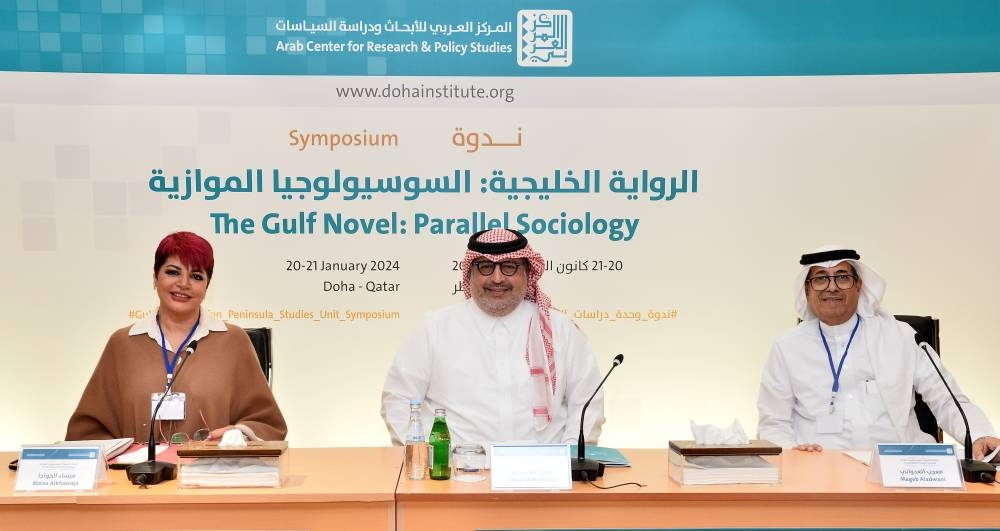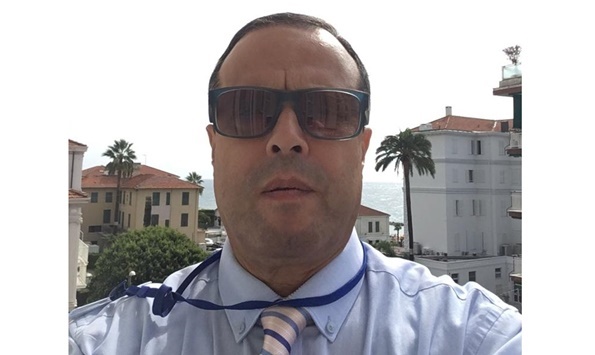The Doha Institute for Graduate Studies (DI), represented by the Gulf and Arabian Peninsula Studies Unit organised a symposium titled “The Gulf novel: Parallel sociology” from January 20-21. The afternoon session on January 21, titled “The other in the narrative in Gulf societies: The other and the narrator,' was moderated by Faisal al-Mudahka, Gulf Times Editor-in-Chief.
He said in his introduction that: “In this session, we will talk about Gulf literature, specifically the Gulf novel, which took a romantic turn at its beginning. The novel “Shahanda” by Rashid Abdullah from the Emirates may be one of the first clear examples of this trend.
"The Gulf novel touched on the transition from desert and sea life to city life after the discovery of oil, which moved Gulf society from the simplicity and harshness of life to the complexity, spaciousness and improvement of the city, as well as the standard of living and education.
"Such as the novel “Cities of Salt” by the Saudi novelist Abdul Rahman al-Manif, which is one of the most famous Arabic novels, which depicts life with the beginning of the discovery of oil and the rapid transformations that befell the cities and villages of the Arabian Peninsula.”
" In this context, we are pleased to welcome Professor Mageb al-Adwani, Professor of Criticism and Theory in the Department of Arabic Language and Literature at the College of Humanities and Social Sciences at King Saud University in Riyadh. Professor Maisa al-Khawaja, Associate Professor of Literature and Criticism in the Department of Arabic Language at King Saud University in Riyadh."
Professor Maisa said that her idea “revolves around how the novel can depict societal transformations and present a vision about a society, and among the questions and problems that such seminars can raise is the idea of identity and the other. "As for me, I said that we always present in our works or writers present others. So I thought about how others view us, and from here came a group of writers who go back to African origins, such as Eritrea and others.
"My paper concerns those who lived in Saudi Arabia, in Jeddah specifically, and wrote about Saudi society, and therefore the idea was about how to create their own identity, and also how to formulate an image of Saudi society. Is this picture imaginary or an approximate picture of what is happening in society, and is it exclusionary? All of this is included within the work of fiction and how it is presented through the characters, through cultural discourse or patterns that exist within the work of fiction.
"The period that I am studying is related to the transformation in Saudi society and the entry into what is called the awakening and the dominance of the clergy, etc., and how these people responded to some laws and some regulations related to dealing with others.
"But the idea is that they are the ones who are writing by themselves and trying to create an identity that distinguishes them or perhaps includes them under the dominant category of society in which they live. I was exposed more to cultural patterns related to religious discourse, racist discourse, the relationship between men and women, and self-discovery and identity and how he rediscovers himself by discovering his own identity, for example, that he is Eritrean and not Saudi or half-Saudi, as he expresses it.” Professor Maisa is interested in what is said behind the speech.
Professor Mageb al-Adwani presented six literary works and stressed that the novel does not relate to reality at all, especially in relation to the representation of the Western or Eastern other. In the novel “Grandma Nina and I,” he pointed to the great symbolic aspect and how good triumphs over evil, stressing that the language of this novel was characterized by simplicity and was based on simple narration. The successful debate is the one that depends on simplicity, in this novel, which shows the relations between the Russian and the Jew among its characters, and openness to Russian culture.
At the conclusion of the session, the speakers agreed that the other is a linguistic event or linguistic fact, so that the issue remains relative.

Professor Maisa al-Khawaja, Faisal al-Mudahka and Professor Mageb al-Adwani at the symposium, Sunday. PICTURE: Shaji Kayamkulam

